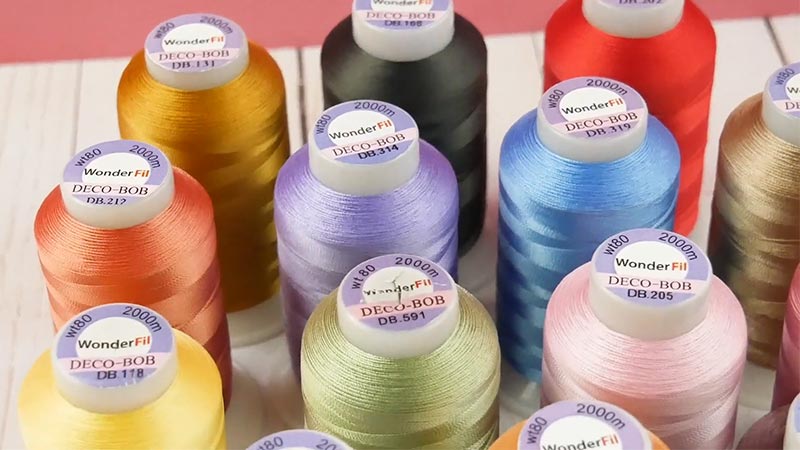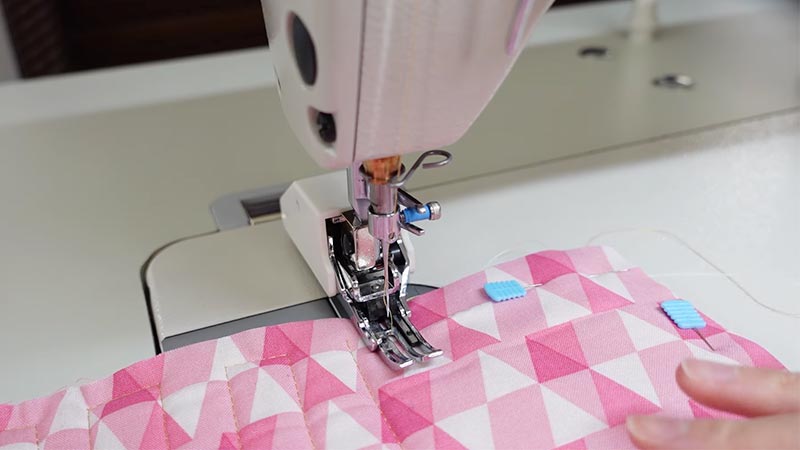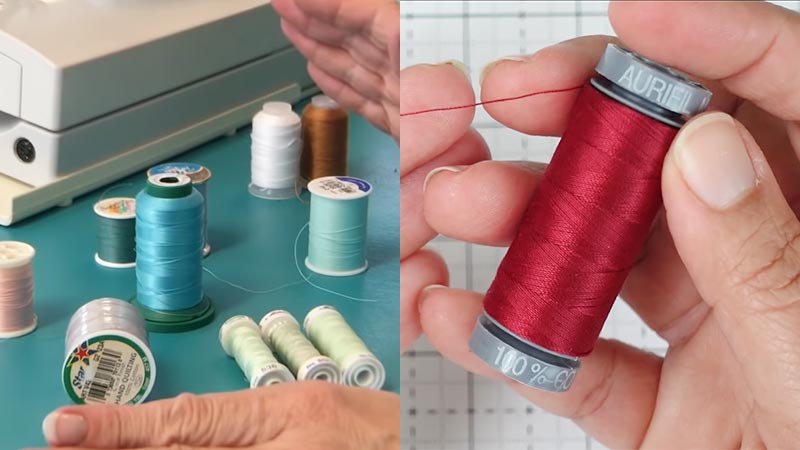Polyester thread has emerged as a versatile and favored choice in the realm of quilting. Known for its exceptional strength and durability, it offers a range of advantages that make it a suitable option for both machine and hand quilting projects.
With minimal stretch and high resistance to moisture, polyester thread ensures that your quilted creations maintain their integrity over time.
Its wide color range and affordability add to its appeal, providing quilters with creative freedom and cost-effective solutions.
However, considerations like heat sensitivity and potential tension issues warrant attention. This introduction delves into the merits and considerations of using polyester thread, illuminating its role in the quilting process.

What Is the Polyester Thread?
Polyester thread is a synthetic thread made from polyester fibers, a type of polymer derived from petroleum. It is known for its exceptional strength, durability, and versatility.
Unlike natural fibers, such as cotton, polyester thread has minimal stretch, making it ideal for applications where stability and resilience are crucial.
It is highly moisture-resistant, making it suitable for outdoor and water-exposed projects. A polyester thread is also colorfast, ensuring that it retains its vibrant hue even after repeated washing.
With a wide range of available colors and weights, it’s a popular choice for various sewing projects, including quilting, apparel, and home décor. It is also cost-effective, making it a practical option for beginners and experienced sewers.
Can You Use Polyester Thread for Quilting?
Yes, you can use polyester thread for quilting. Polyester thread is a versatile option that works well for quilting, whether you’re quilting by hand or using a sewing machine.
Here’s a more detailed explanation of why polyester thread is suitable for quilting:
Durability
Polyester thread is known for its strength and durability. It can withstand the rigors of machine quilting, including high-speed sewing and tension adjustments, without breaking or fraying easily. This is particularly important for quilts that will see frequent use and washing.
Low Stretch
Polyester thread has minimal stretch compared to other threads like cotton. This characteristic helps maintain the integrity of the stitches over time, ensuring that your quilt remains in good condition even after multiple washes.
Colorfastness
A polyester thread is generally colorfast, making it less likely to fade or bleed during washing.
This is especially important for using vibrant or dark-colored fabrics in your quilt, as it helps prevent color transfer.
Wide Color Range
Polyester thread comes in a wide range of colors, making it easy to find a thread that complements your quilt’s design.
This variety allows you to match or contrast the thread with your fabrics, giving you creative flexibility.
Affordability
Polyester thread is often more budget-friendly compared to other specialty quilting threads. This makes it an attractive option for quilters, especially those just starting out or working on large projects.
Ease of Use
Polyester thread tends to glide smoothly through the fabric, whether you’re sewing by hand or using a machine. It creates even clean stitches, making it suitable for intricate quilting patterns or free-motion techniques.
Resistance to Moisture
A polyester thread is less susceptible to moisture absorption than natural fibers like cotton. This makes it a good choice for quilts that might be used in damp environments or those that are likely to be exposed to spills or moisture.
Hypoallergenic
Polyester thread can be a good alternative for individuals with allergies to natural fibers. It doesn’t contain any natural proteins that can cause allergic reactions.
Special Considerations When Using Polyester Thread

When using polyester thread for sewing or quilting, there are several special considerations to keep in mind to ensure the best results:
Heat Sensitivity
Polyester thread has a lower melting point than other thread types like nylon or silk.
This means that if you use a hot iron on your project, the thread is likely to melt or become damaged. To avoid this issue, using a lower heat setting when pressing fabric or seams is important.
Thread Weight and Needle Size
Matching the thread weight to the needle size is crucial for smooth stitching. For thicker threads, choose a larger needle to prevent friction and breakage. Using the wrong needle size can lead to tension issues and uneven stitches.
Tension Adjustment
The polyester thread may require some adjustments to the tension settings on your sewing machine. Test your machine with scrap fabric before starting your project to ensure the thread feeds smoothly and stitches evenly.
Avoid Using Harsh Chemicals
While polyester is generally resistant to chemicals and solvents, avoiding exposure to harsh substances is still advisable. Some chemicals can weaken or damage the thread over time.
Storage and Handling
Store your polyester thread away from direct sunlight and in a cool, dry place. This helps preserve its quality and prevents any potential damage from exposure to environmental factors.
Consider the Project Type
Polyester thread is versatile, but it may not always be the best choice for every project.
For example, if you’re working on an heirloom quilt intended to be passed down through generations, you might prefer using a natural fiber thread for its historical significance and longevity.
Pretesting
Before starting a large or critical project, doing a test run on a similar fabric with the same thread and machine settings is a good idea. This can help you identify any potential issues or adjustments that need to be made.
Thread Quality
Invest in high-quality polyester thread. Cheaper, lower-quality threads may have more inconsistencies and are more likely to break or cause tension issues.
Difference Between Cotton and Polyester Thread

Cotton and polyester threads are two commonly used types of threads in sewing, and they have several differences in terms of their composition, characteristics, and applications.
Here are the key distinctions between cotton and polyester thread:
Composition
- Cotton Thread: Cotton thread is made from natural cotton fibers, which are spun and twisted together to form the thread. It is a natural, plant-based material.
- Polyester Thread: Polyester thread is made from synthetic polyester fibers derived from petroleum. It is a man-made, synthetic material.
Strength and Durability
- Cotton Thread: Cotton thread is less strong and durable than polyester thread. It is more prone to breaking under tension and wear and tear.
- Polyester Thread: Polyester thread is known for its exceptional strength and durability. It can withstand high levels of tension and is less likely to break.
Stretch
- Cotton Thread: Cotton thread has some natural stretch, which can be advantageous in certain sewing applications but may not maintain its shape, as well as polyester.
- Polyester Thread: Polyester thread has minimal stretch, which provides stability to stitches. It retains its shape better.
Colorfastness
- Cotton Thread: Cotton thread may fade or lose color intensity over time and with repeated washing. It is less colorfast.
- Polyester Thread: Polyester thread is generally more colorfast and resistant to fading or bleeding. Colors tend to remain vibrant.
Moisture Resistance:
- Cotton Thread: Cotton thread absorbs moisture readily, which can lead to weakening when exposed to wet conditions.
- Polyester Thread: Polyester thread is less absorbent and more moisture-resistant, making it suitable for outdoor or water-exposed projects.
Applications
- Cotton Thread: Cotton thread is commonly used for sewing natural fiber fabrics like cotton, linen, and silk.
- Polyester Thread: Polyester thread is versatile and suitable for various fabrics, including synthetics, blends, and natural fibers.
FAQS
Can I use polyester thread for hand quilting?
Yes, polyester thread is suitable for hand quilting. Its strength and durability make it viable for both hand and machine quilting projects.
Is polyester thread colorfast and resistant to fading?
Yes, polyester thread is generally colorfast and less likely to fade or bleed during washing. This makes it a reliable choice for quilts with vibrant or dark-colored fabrics.
Does polyester thread have any special considerations?
Yes, polyester thread is sensitive to heat. When pressing your quilt, use a lower heat setting on your iron to avoid damaging the thread.
Is polyester thread suitable for intricate quilting patterns or free-motion quilting techniques?
Yes, polyester thread glides smoothly through the fabric, creating even, reliable stitches. This makes it suitable for intricate quilting patterns and free-motion techniques.
Can I use polyester thread for outdoor or water-exposed quilting projects?
Yes, polyester thread is less absorbent and more moisture-resistant than natural fibers like cotton.
To Recap
Polyester thread stands as a reliable and practical choice for quilting enthusiasts. Its robustness and low stretch offer assurance of enduring quality in quilting projects.
The wide array of colors perfectly matches any design vision, while its affordability is a boon for budget-conscious crafters. Despite minor drawbacks, such as heat sensitivity, the benefits outweigh any potential concerns.
Whether you’re a novice or a seasoned quilter, polyester thread’s versatility and durability make it a valuable tool in creating quilts that stand the test of time.
Embracing this thread opens up a world of creative possibilities, enhancing the artistry and longevity of your quilting endeavors.
Leave a Reply